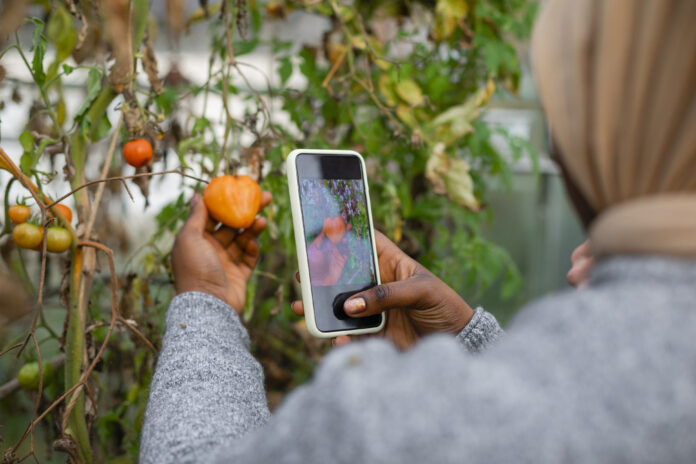In an exploration of environmental consciousness within the Black Muslim community, disparities in perspectives on climate change emerge. While statistics may indicate lower acknowledgment of human-caused climate change among Black Muslim Americans, their diverse experiences and initiatives toward sustainability tell a more complex story. The Black Muslim community is not a monolith. Black Muslims have been at the forefront of significant initiatives and practices that contribute to sustainability and climate awareness.
Green Ramadan: Kori Majeed’s Vision for a Sustainable Islamic Practice
Although the intersectionality of Islam and sustainability is clear, some work to make sure Muslims in their community actively bring the two together. Kori Majeed, Founder of Green Ramadan and Chair of the Green Team at Masjid Muhammad in Washington, DC, views sustainability as a revival of the sunnah, or practices, of Prophet Muhammad ﷺ.
Spearheaded by Majeed, Green Ramadan that aims to inspire Muslims to ‘eat mindfully and tread lightly’ every Ramadan. “Some Muslims feel that they cannot fully connect with the environmental and climate justice movement because of its exclusion of the heartwork that needs to be addressed alongside healing of the natural world. Sustainability and environmental justice is part of our deen and the way of our Prophet ﷺ, and we must bring our spiritual capacities to the table in order to do this vital work,” Majeed says.
Read More: The Quran, Sunnah, and the Path to Climate Justice
“The experience of being Black Muslim gives us a unique untapped perspective. I see this in the way Ibrahim Abdul-Matin’s book has been able to touch the hearts of Muslims of many ethnicities around the globe.” Abdul-Matin describes a pivotal moment in his climate awakening within his book, Green Deen. On a hiking trip, his father told him the saying of the Prophet Muhammad (pbuh): “Wherever you may be at the time of prayer, you may pray, for it (the Earth) is all a mosque.”
Majeed compares her environmental work to practicing archery. “My intention is the arrow. My work is pulling the bow string back. Allah knows best where the arrow will land.” Majeed heavily expresses having trust in Allah and relying on his mercy. “I believe in climate qadr, in that we are experiencing the decree of Allah. It happens over and over in the Quran: Allah sends signs to nations, signs in the universe and within themselves,” Majeed says. “Will we heed the abundance of signs? Experiencing extreme weather events can lead us into despair or anxiety because of the uncertainty of our individual and collective future. I prefer to lean into hope for Allah’s mercy and that Allah promises relief after difficulties and trials.”
Black Muslims in America are undoubtedly excited about environmentalism, but may not receive much attention. “The Black Muslims I interact with are generally excited about how our faith promotes sustainable living,” Majeed says, “However, our communities usually do not have the resources to make infrastructure changes and improvements because of other pressing issues. It takes money to be green when the infrastructure of consumerism makes it easy to be wasteful.”
The infrastructure of consumerism is well-built. The healing that many Black Muslims in America want to happen in the environment as a whole often starts close, within themselves and their homes.
Malika Pham Champions Sustainable Living, Starting With Her Oasis
As a Black Muslim in America, Malika Pham uses social media to share her sustainability practices and lifestyle. Nature is a part of her everyday life, and as a mother of three homeschoolers, she realized she had to establish handling waste in a sustainable way as a foundation for her children.
Pham has her own at-home “green oasis,” with fig, pomegranate, olive, lemon, Asian pear and nectarine trees. “If you look at the majority of Black Muslims in America, if they never actually experienced that (sustainable lifestyle), then it’s going to be foreign to them, even if it may be part of who they are three or four generations back,” Pham says, citing her time growing up in a nature-forward environment.
Read More: Fasting from Consumerism: How to Embrace Minimalism
“Black people were the kings and queens of making do… but there are so many other hurdles to get to that freedom,” Pham explains. For Black people living in an American capitalistic economy, the focus is primarily towards enduring constant challenges.
“There are so many other things that Black people are dealing with… it’s about survival. I think a lot of us are in survival mode and have been, so we do our best at what we can. There’s also another side to it, that Black people don’t ever get credit for having sustainable practices, which we have out of necessity,” Pham says. Reusing and reducing have long been a core aspect of the Black community’s fortitude. Despite this, one out of every five Black households is victim to acts of food apartheid. These households are subject to living in ‘food deserts’ where access to fresh food is sparse.
Traditional African American cooking practices originated from the incorporation of left-over and scrap foods from ingredients seen as ‘less than’ in the culinary world. “We have a big culture of zero-waste and non-Black people are sharing this as a ‘new idea’ when we’ve actually been doing this for some time now. We just haven’t capitalized on it because it was what we had to do,” Pham says.
The inverse of the issue remains to be prevalent. Pham cites the financial issues Black people experience as the cause of some difficult decisions, such as succumbing to fast fashion practices that harm the environment. “There are systemic blockades geared towards Black people, like home ownership and not being able to afford a place where you afford to grow anything of your own,” Pham says. “Everything comes at a cost.” She hopes to use her growing platform to normalize environmentally conscious efforts like thrifting, gardening and low plastic use in masjids.
The focus on disconnected aspects such as polar ice caps melting or only animals deep within nature being affected pulls away from issues closer to home. Climate change is affecting urbanites right under their noses.
Ahlam Osman Addresses Climate Challenges In Urban Environmental Advocacy
Ahlam Osman, a Somali environmental activist based in Oregon, addresses the strife Black Muslim Americans face in the realm of sustainability. “I think we need more Black Muslims in the field of city planning and design… we need to be in these decision-making and leadership roles. This field, and really environmental sustainability-related fields, are heavily dominated by whiteness, so essentially our cities are being built without our communities in mind,” Osman says.
Osman works with Faithfully Sustainable, a community organization working to bridge the Muslim faith with sustainability. She’s also a part of Somali Empowerment Circle, an organization that serves and empowers Somalis in the Portland Metro area. The SEC also partners with architectural designers to ensure homes are built with immigrant and multi-generational families in mind.
Climate change disproportionately affects Black communities. “When you look at urban environmental issues, such as the lack of walkability and green spaces in predominantly black and brown neighborhoods… These are problems that environmental advocates account for,” Osman says.
The Ongoing Narratives of Black Muslim Americans
Black Muslim activists and authors like the late Ibrahim Abdul-Matin continuously show conviction in their own faith. There is a lot to learn from Muslims who fearlessly anticipate Allah’s plan when already tested with difficulty. There is no better legacy to learn patience from than those who have been tested the most.
The monolithic view of Black Americans as victims of climate change reduces the actuality of their long-withstanding efforts towards a naturalistic lifestyle. Spirituality within the Black Muslim community is a repetitive theme in both understanding and coming to terms with the climate’s trajectory.
Malika Pham is a community member. | Instagram: @_malika_yasmin_
Ahlam Osman is an environmental activist. | Instagram: @ahlam.jpeg
Kori Majeed is the founder of Green Ramadan. | email: kori@greenramadan.com | Instagram: @greenramadan



